Find Help
More Items From Ergsy search
-
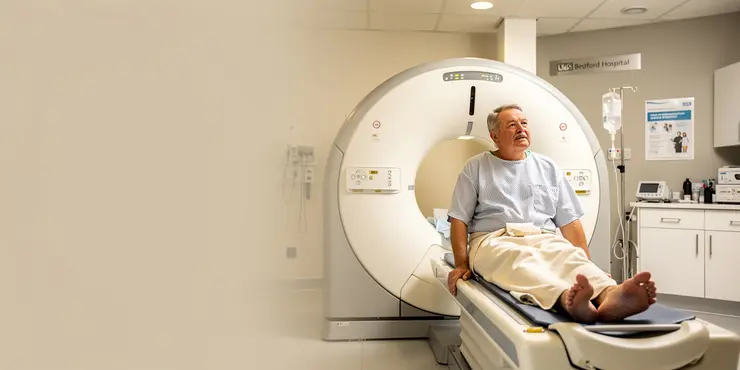
Having a CT scan in Hospital - What's it like having a CT scan at Bedford Hospital?
Relevance: 100%
-
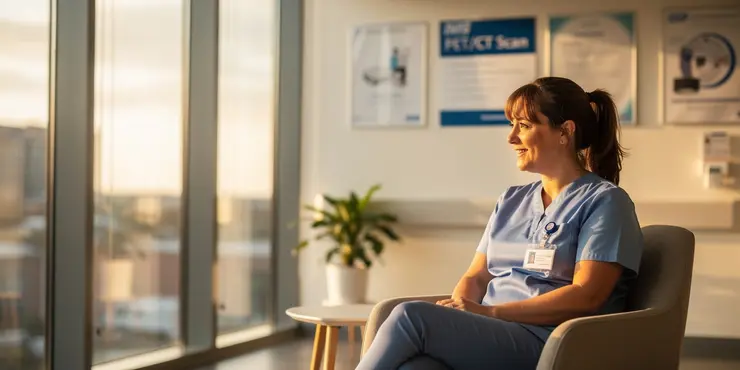
Your PET/CT scan at University College Hospital
Relevance: 86%
-
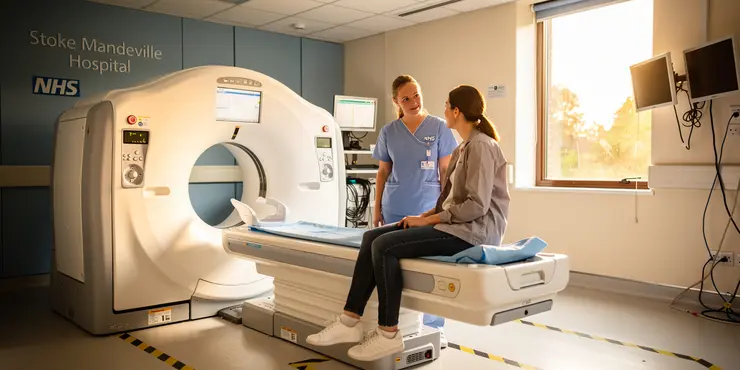
Having a CT Scan at Stoke Mandeville Hospital - Buckinghamshire Healthcare NHS Trust
Relevance: 80%
-
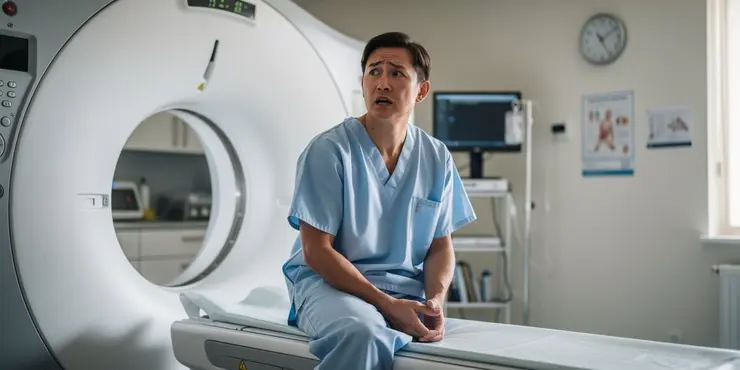
Going for an MRI Scan
Relevance: 67%
-
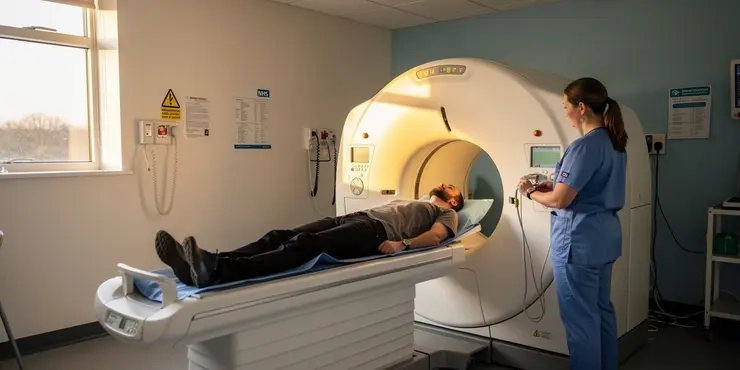
Having a CT Scan in Tayside
Relevance: 66%
-
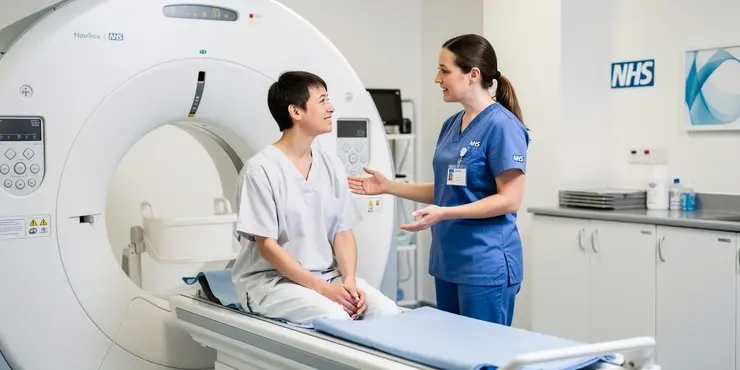
Going For a CT Scan
Relevance: 63%
-
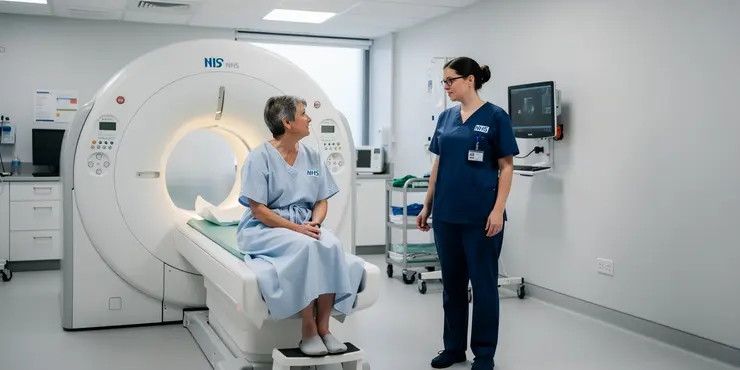
I'm having an MRI scan
Relevance: 63%
-
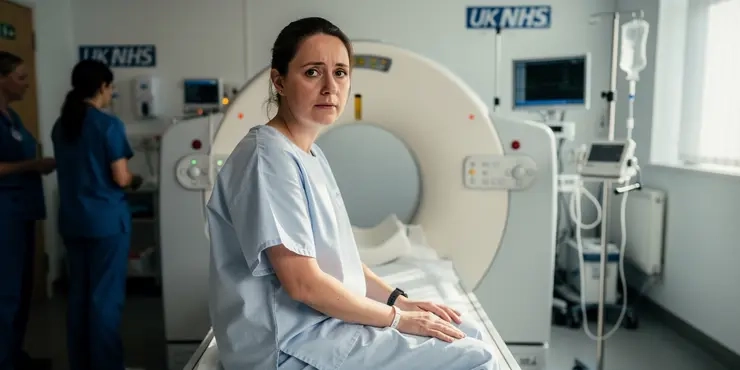
So, you're having a CT scan...
Relevance: 62%
-
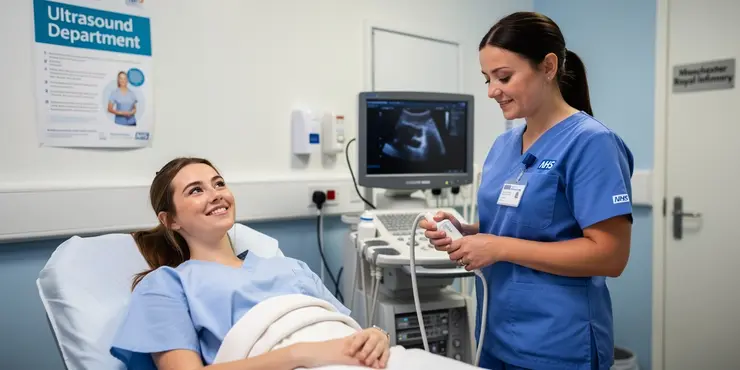
Having an Ultrasound scan at Manchester Royal Infirmary
Relevance: 60%
-
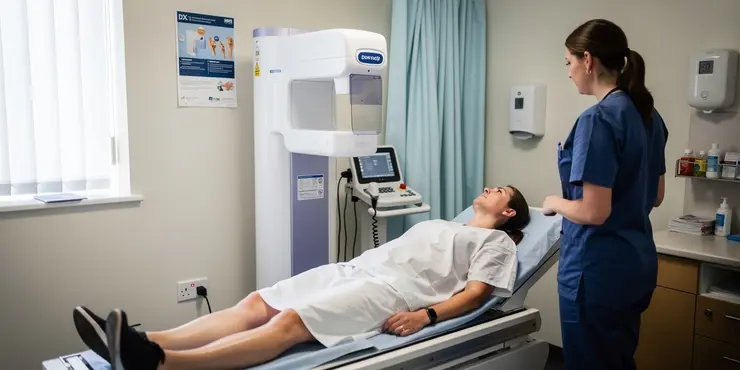
What to expect of a DXA Scan
Relevance: 60%
-
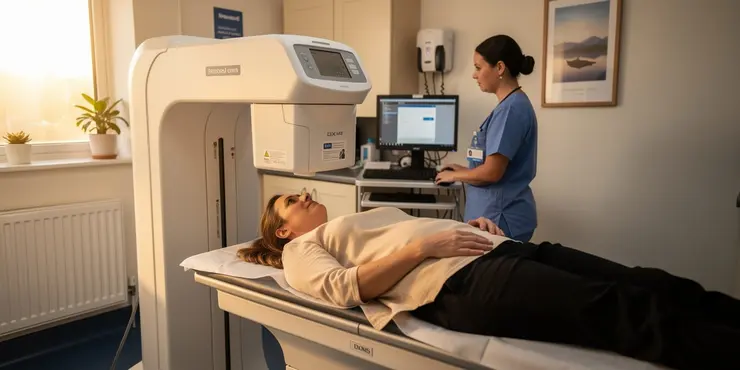
What to expect of a DXA Scan
Relevance: 60%
-
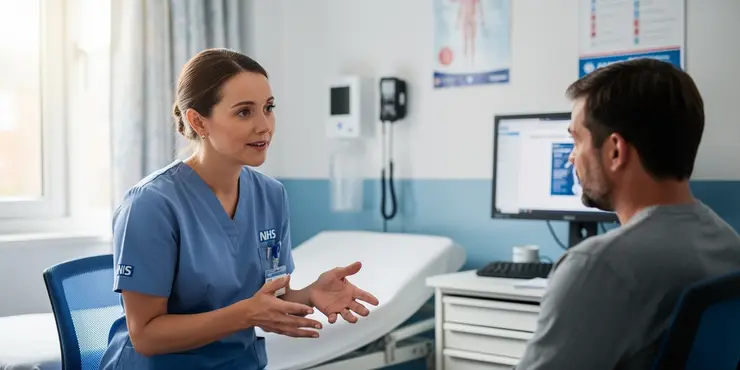
Are AI body scans reliable?
Relevance: 60%
-
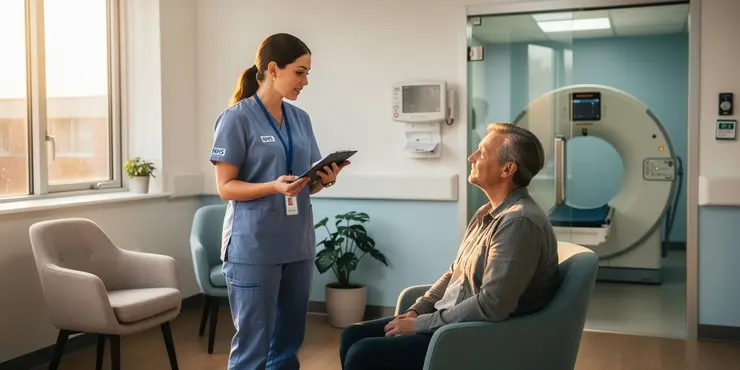
What is a low-dose CT scan for lung cancer?
Relevance: 57%
-
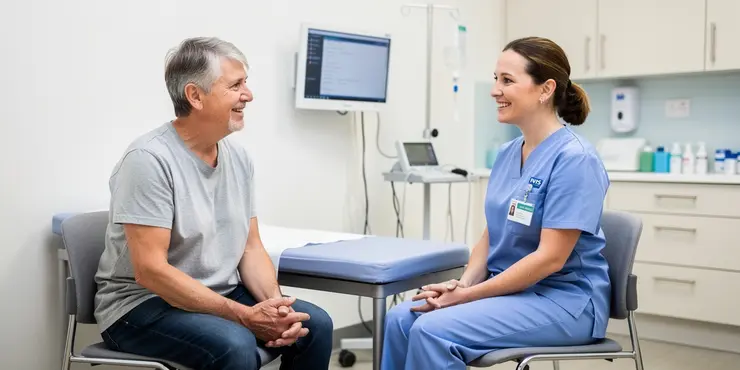
The FDG PET Scan: What to expect
Relevance: 57%
-
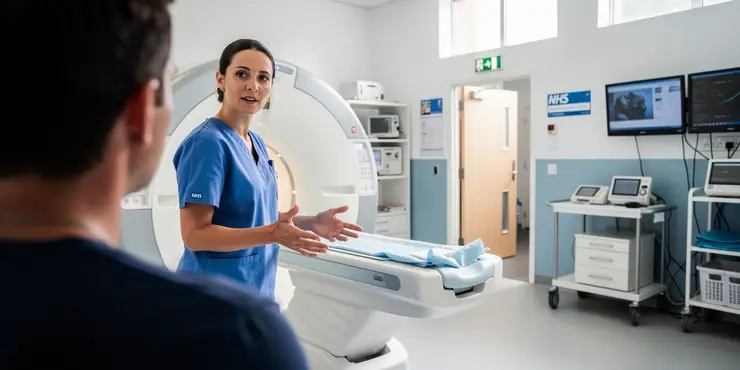
How Does an MRI Scan Work?
Relevance: 55%
-
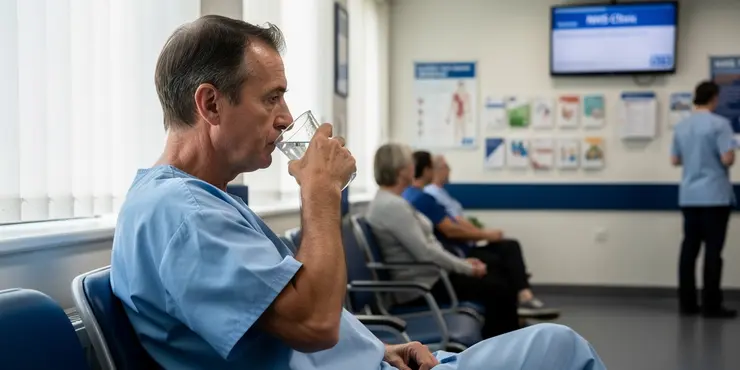
Patient video: What to expect when having a bone scan
Relevance: 54%
-
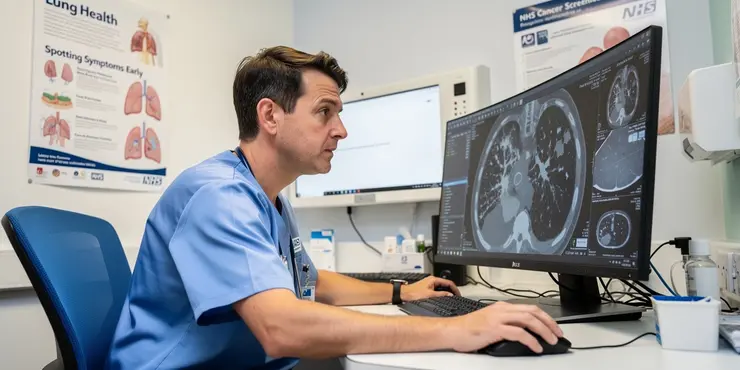
How do AI algorithms detect lung cancer in scans?
Relevance: 52%
-
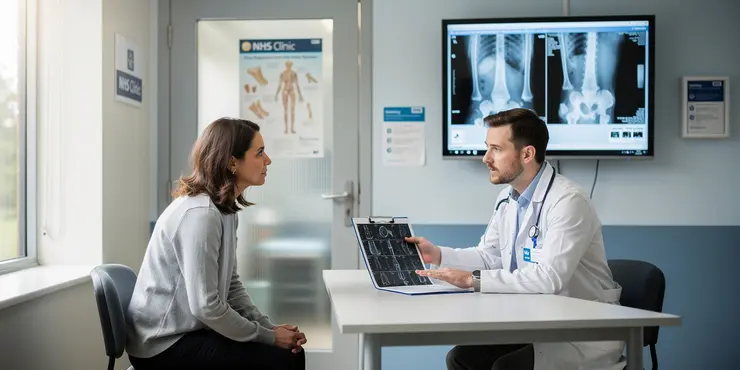
What is the purpose of a bone scan in prostate cancer treatment?
Relevance: 51%
-
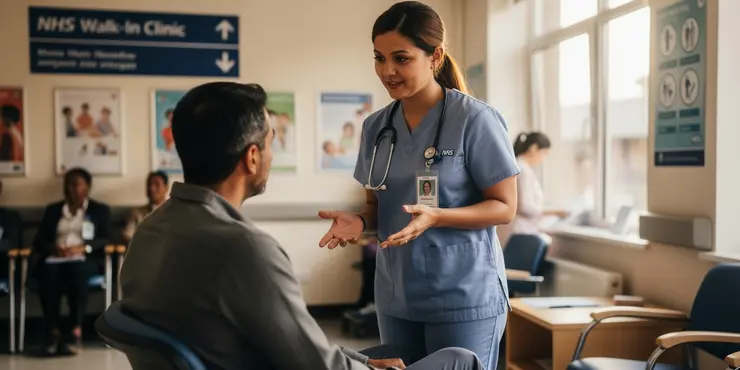
Will language barriers be an issue in EU hospitals?
Relevance: 45%
-
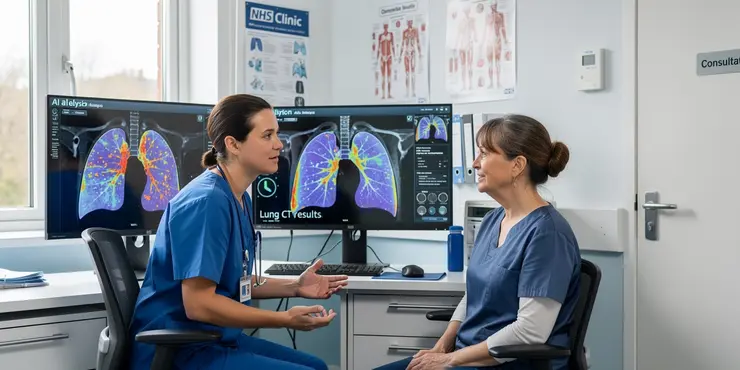
Is AI technology in lung cancer detection widely accepted by hospitals?
Relevance: 42%
-
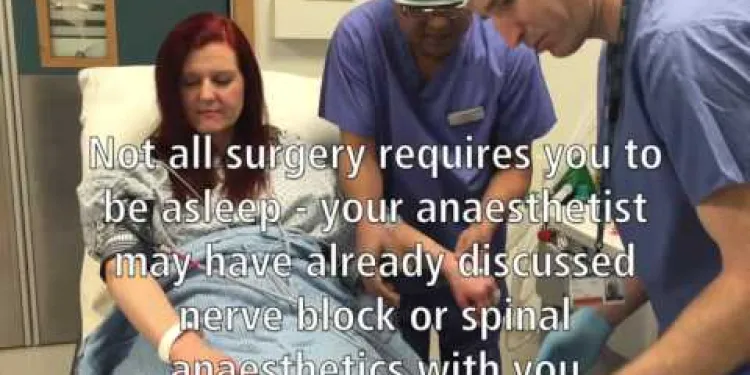
Your Operation at East Surrey Hospital
Relevance: 41%
-
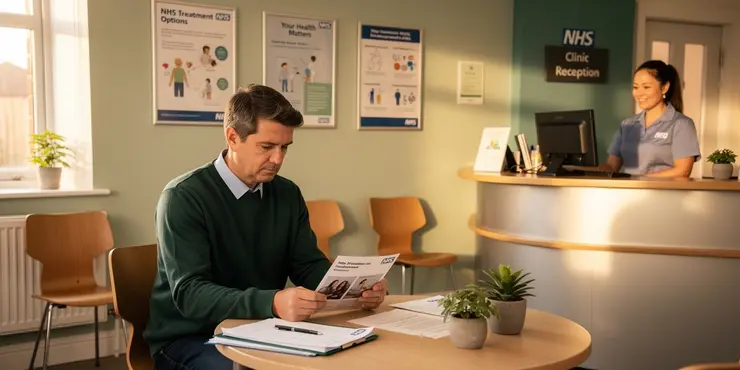
How do I find a suitable hospital or clinic for my treatment?
Relevance: 41%
-
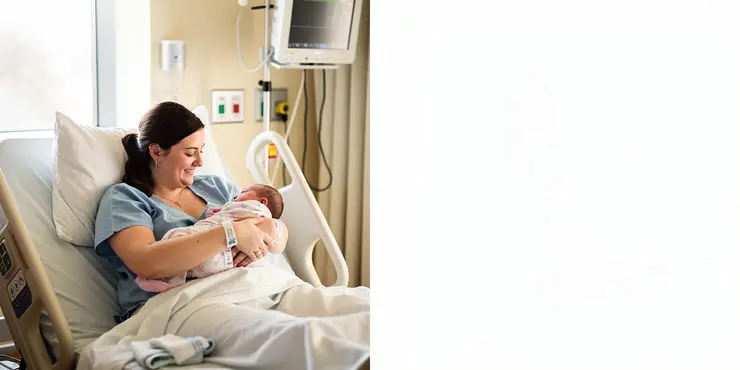
How long will I stay in hospital after a C-section?
Relevance: 41%
-
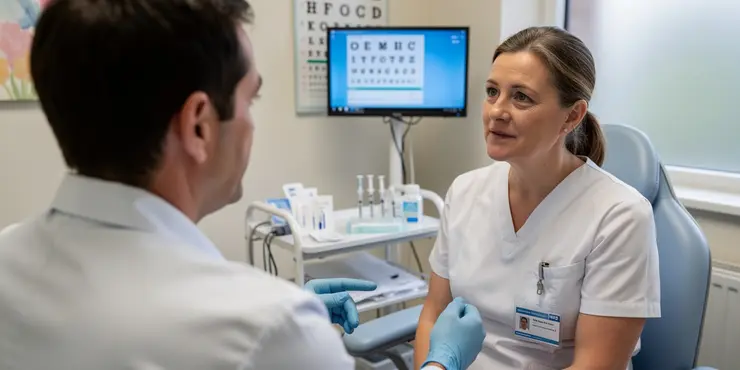
Eye Injections at Royal Bournemouth Hospital
Relevance: 41%
-
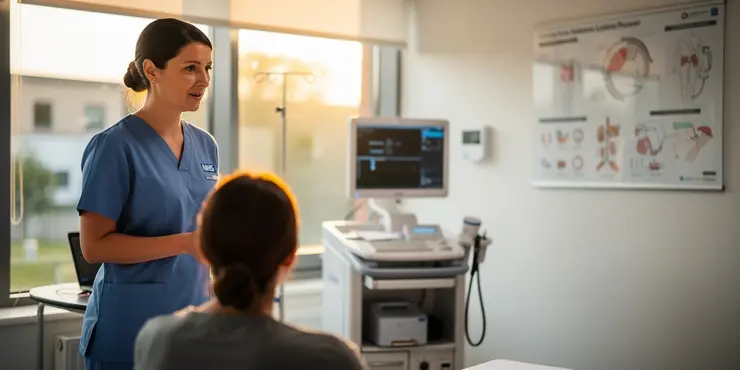
Radiotherapy Services at University Hospital
Relevance: 40%
-
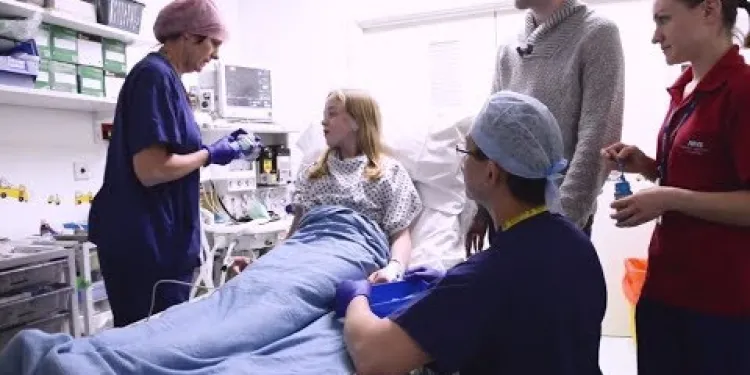
Having an operation in Oxford Children's Hospital with YiPpEe
Relevance: 40%
-
Can I shorten my waiting time by choosing a different hospital?
Relevance: 40%
-
Do private hospitals have shorter waiting times for operations?
Relevance: 40%
-
Are waiting times for operations the same across all hospitals?
Relevance: 40%
-
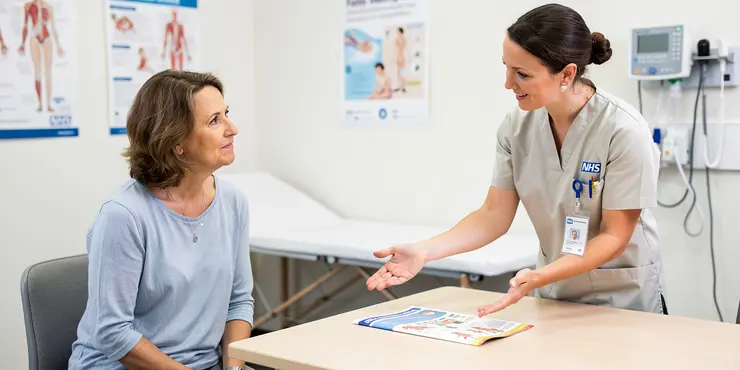
Falls Prevention video for patients attending hospital
Relevance: 39%
-
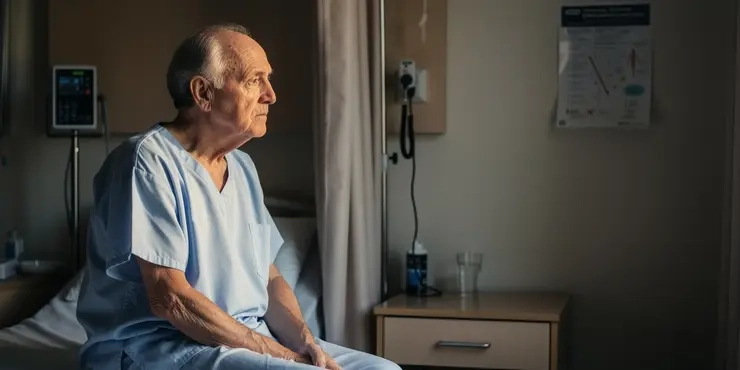
Delirium: A Patient Story at Leicester's Hospitals
Relevance: 39%
-
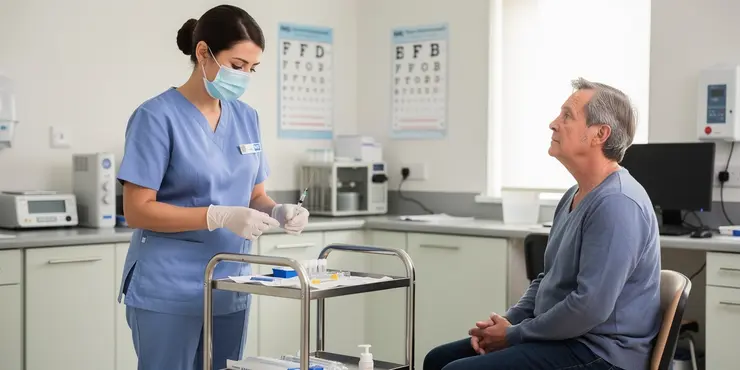
Eye Injections at Royal Bournemouth Hospital
Relevance: 39%
-
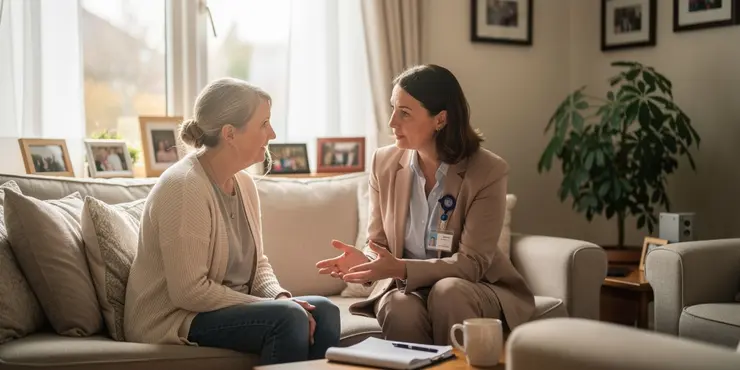
Does the NHS offer an online hospital for menopause?
Relevance: 39%
-
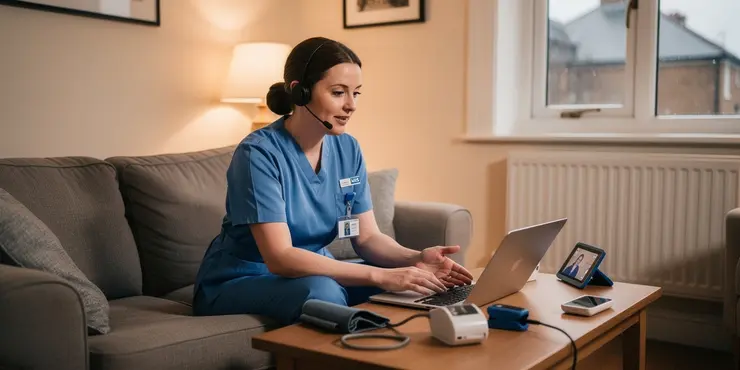
Can virtual wards reduce hospital overcrowding?
Relevance: 38%
-
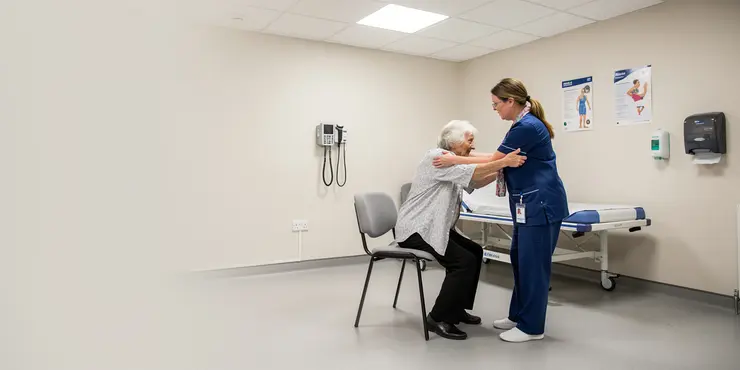
Fallsafe - Put the patient first. Preventing falls in Hospital.
Relevance: 38%
-
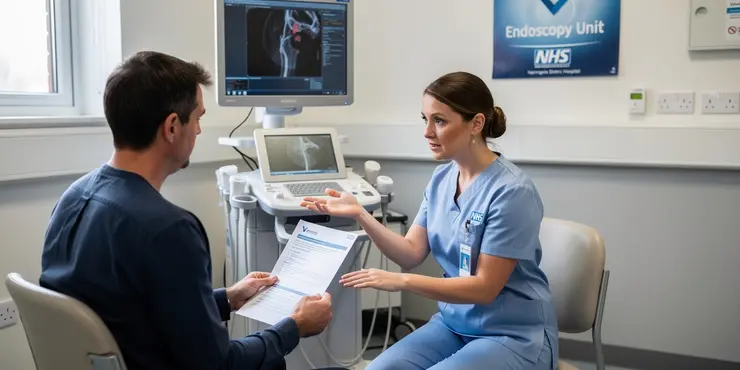
Coming to the Endoscopy Unit at Harrogate District Hospital
Relevance: 38%
-
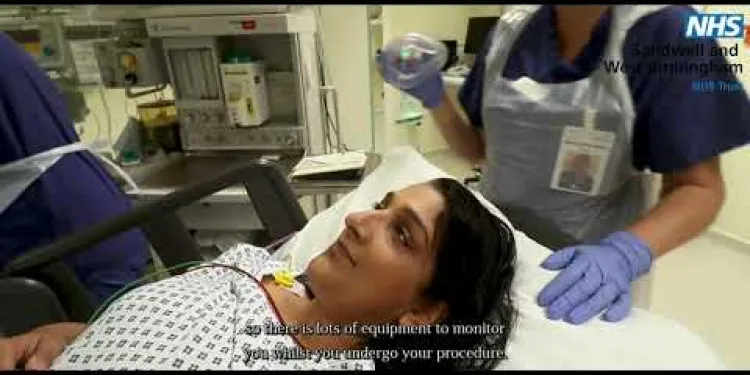
What to expect when visiting our hospitals for surgery | Theatres
Relevance: 37%
-
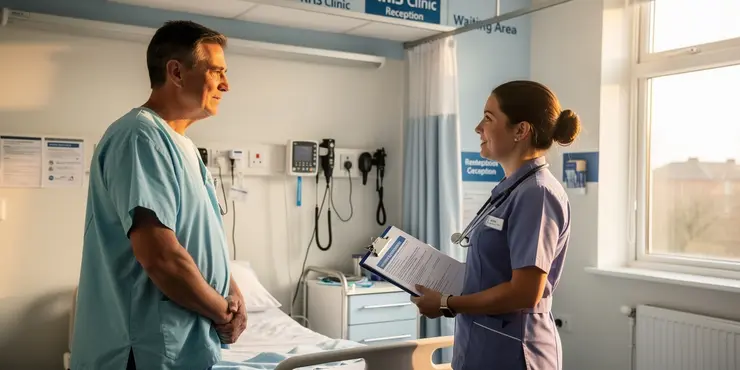
What to expect when visiting our hospitals for surgery | Theatres
Relevance: 37%
-
How can I find current waiting times for operations in my local hospital?
Relevance: 37%
-
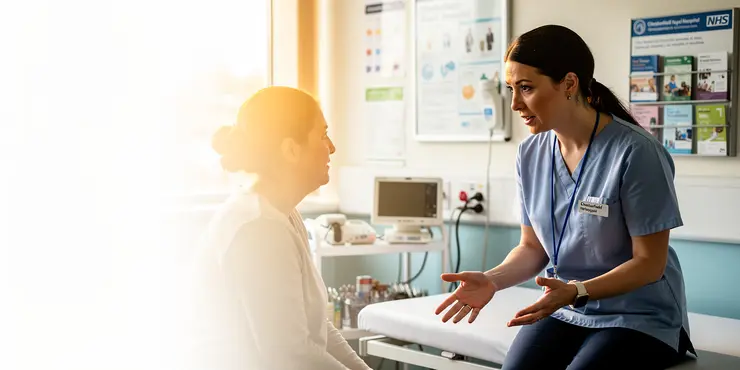
Gastroscopy - What to Expect on Referral to Chesterfield Royal Hospital
Relevance: 36%
Having a CT Scan at Bedford Hospital
Introduction to CT Scans
A Computed Tomography (CT) scan is a medical imaging procedure that uses X-rays to create detailed images of the inside of your body. These scans are crucial for diagnosing and monitoring various medical conditions. If you have been referred for a CT scan at Bedford Hospital, you're likely curious about the process. Below, we outline the key aspects of having a CT scan at this facility.Preparation Before the Scan
Before your CT scan at Bedford Hospital, you may receive specific instructions depending on the type of scan. Generally, you'll be asked to avoid eating or drinking for a few hours beforehand. It's important to wear comfortable clothing and leave any metal objects, like jewellery and watches, at home. You might also be given a contrast dye to ingest or have injected, which helps enhance the image quality.Upon Arrival at Bedford Hospital
When you arrive at Bedford Hospital for your CT scan, head to the imaging department. The reception staff will guide you through the process, and you may need to fill out a brief medical questionnaire. This is an excellent time to discuss any concerns or questions you have about the procedure with the medical team.The CT Scan Procedure
During the CT scan, you will lie on a flat bed that moves slowly into the CT scanner, which is a large, doughnut-shaped machine. The radiographer will be in an adjacent room but can see, hear, and speak to you throughout the procedure. You will need to stay as still as possible to ensure clear images. The scan usually takes about 10 to 30 minutes, depending on the area being examined.After the CT Scan
Once the scan is complete, you can usually go home right away unless you have been given a sedative or had a contrast dye. In such cases, it might be necessary to wait for a little while for monitoring purposes. Drinking plenty of fluids will help flush the contrast dye from your system if one was used. The scan results will be reviewed by a radiologist, and your doctor will discuss them with you during a follow-up appointment.Conclusion
Having a CT scan at Bedford Hospital is a straightforward process designed to ensure your comfort and safety. The highly trained staff and state-of-the-art equipment ensure that you receive the best possible care. If you have any specific concerns or conditions that need attention, the compassionate team at Bedford Hospital is always ready to assist you.Having a CT Scan at Bedford Hospital
What is a CT Scan?
A CT scan is a special kind of picture of the inside of your body. It uses X-rays to see inside you. Doctors use it to find out what is wrong or to check how well you are doing.Getting Ready for Your CT Scan
Before you have a CT scan, you might need to follow some instructions. You may be told not to eat or drink for a few hours before the scan. Wear comfy clothes, and leave metal things like jewellery at home. Sometimes, you need a special dye to help make the pictures clear. This dye can be a drink or an injection.When You Arrive at the Hospital
Go to the imaging department when you get to Bedford Hospital. The reception staff will help you. You might fill out a short form about your health. This is a good time to ask any questions you have about the scan.The CT Scan Process
During the scan, you will lie on a bed that moves into a big machine shaped like a doughnut. The person taking the scan, called a radiographer, will be in another room but can talk to you. Try to keep as still as you can so the pictures are clear. The scan takes about 10 to 30 minutes, depending on what needs to be checked.After Your CT Scan
After the scan, you can usually go home right away. If you had a sedative or contrast dye, you might need to stay a bit longer to be sure you feel okay. Drink lots of water to help the dye leave your body. A special doctor, called a radiologist, will look at the scan results. Your own doctor will talk to you about the results later.Final Thoughts
Having a CT scan at Bedford Hospital is simple and safe. The staff are well trained, and the machines are very good at what they do. If you have any worries or need help, the team at Bedford Hospital is there to support you.Frequently Asked Questions
What is a CT scan?
A CT (Computed Tomography) scan is a medical imaging procedure that uses computer-processed combinations of many X-ray measurements taken from different angles to produce cross-sectional images of specific areas of a scanned object.
Why might I need a CT scan?
A CT scan is used for detecting various conditions such as tumors, infections, blood clots, fractures, and other disorders. It provides detailed images that help doctors diagnose and monitor these conditions.
How do I prepare for a CT scan?
Preparation for a CT scan may vary based on the type of scan. You might be asked to fast for a few hours before the scan, especially if a contrast dye is being used. Follow the specific instructions given by your healthcare provider.
Will I need to remove my clothes for the CT scan?
You may need to change into a hospital gown for the scan and remove any metal objects such as jewellery, glasses, or hearing aids as they can interfere with the imaging.
What happens during a CT scan?
During the scan, you will lie on a motorized table that slides into the CT scanner. You will need to stay still, and you may be asked to hold your breath for short periods while the scanner takes images.
How long does a CT scan take?
The duration of a CT scan can vary but typically takes between 10 to 30 minutes depending on the area being scanned and the type of scan being performed.
Is a CT scan painful?
A CT scan is a painless procedure. However, you might experience slight discomfort if you need to hold a specific position or hold your breath during the scan.
What is a contrast dye, and why might I need it?
A contrast dye, or contrast agent, is a substance used to enhance the visibility of specific organs, blood vessels, or tissues during the CT scan. It can be administered orally, intravenously, or rectally depending on the area being examined.
Are there any risks associated with a CT scan?
CT scans involve exposure to a small amount of radiation. The benefits of accurate diagnosis generally outweigh the risks. If a contrast dye is used, there is a small risk of an allergic reaction.
Can I drive myself home after a CT scan?
Yes, you can drive yourself home after a CT scan unless you have been given medication to help you relax, in which case you should arrange for someone to drive you.
When will I get my CT scan results?
The radiologist will review the images and send a report to your referring doctor. This process usually takes a few days, but it can vary depending on the urgency and specific circumstances.
Can I eat and drink normally after my CT scan?
Yes, you can usually eat and drink normally after your CT scan unless you have been given specific instructions by your healthcare provider.
Will my GP get a copy of my CT scan results?
Yes, your GP or the healthcare professional who referred you for the CT scan will receive a copy of the results.
What should I do if I feel unwell after the CT scan?
If you feel unwell after the CT scan, especially if you had a contrast dye, you should contact your healthcare provider immediately for advice.
How do I book a CT scan at Bedford Hospital?
You will need to be referred by your GP or a specialist. Once referred, the hospital will contact you to arrange an appointment for your CT scan.
What is a CT scan?
A CT scan is a special kind of picture of the inside of your body.
It uses a big camera to take many pictures of the inside of your body from different angles.
The pictures help doctors see things like bones, organs, and other body parts. This helps them understand how healthy you are.
You might lie down on a bed that moves into a big, round machine to get a CT scan.
To make it easier, ask a grown-up to explain each step to you.
You can take deep breaths to help you stay calm.
A CT scan is a type of medical test. It uses special X-ray pictures from different angles. A computer puts these pictures together to see inside the body.
Why might I need a CT scan?
A CT scan is a special kind of picture that doctors use to see inside your body. It is like a super camera that helps them check if everything is okay.
Here are some reasons you might need a CT scan:
- If you have a pain and the doctor wants to see why.
- If you had an accident, the doctor can see if you got hurt inside.
- If you feel sick, the doctor can check to find out more.
If you have questions, you can ask a nurse or doctor. Let's use pictures and simple words to understand better!
A CT scan is a special picture of the inside of your body. It helps doctors find things like bumps, germs, or broken bones. These pictures show a lot of detail, so doctors can tell what's wrong and keep an eye on it.
Here are some things that can help with reading:
- Use a pointer to follow along as you read.
- Ask someone to read it out loud with you.
- Use a ruler or your finger to keep your place.
Getting Ready for a CT Scan
A CT scan is a special picture of the inside of your body. Here’s how to get ready:
- Wear comfy clothes.
- Ask if you need to stop eating or drinking before the scan.
- Tell the doctor if you feel scared or worried. They can help you feel calm.
- You might need to take off jewelry or glasses.
Try using tools like a picture schedule to remember what to do. You can also ask a friend or family member to help you.
Getting ready for a CT scan can be different. Sometimes you might need to stop eating or drinking for a few hours before the scan. This is important if they are using a special dye called contrast. Listen carefully to what your doctor or nurse tells you to do.
Do I have to take off my clothes for the CT scan?
You might need to put on a special hospital outfit for the scan. You should also take off any metal things like jewellery, glasses, or hearing aids because they can mess up the pictures.
What happens during a CT scan?
When you have a CT scan, you lie down on a special bed. The bed moves slowly through a big, round machine. This machine takes pictures of the inside of your body. It does not hurt and helps doctors see what's happening inside you.
If you feel worried, you can ask someone to explain the scan to you. You can also take deep breaths to help you feel calm.
If you want, you can bring a favorite toy or listen to music to help you relax during the scan.
During the scan, you will lie on a table with a motor. The table will move into the CT scanner. You need to stay still. Sometimes, you will be asked to hold your breath for a short time while the scanner takes pictures.
How long will a CT scan take?
A CT scan is a special picture of the inside of your body. It usually takes about 30 minutes. The scan itself is quick, but getting ready might take a bit longer.
You might find it helpful to:
- Breathe slowly to stay calm.
- Close your eyes if you feel scared.
- Ask someone to come with you for support.
A CT scan is a special kind of X-ray. It usually takes about 10 to 30 minutes.
Does a CT scan hurt?
A CT scan does not hurt. It is like taking a special picture of the inside of your body. You lie down on a bed, and the bed slowly moves through a large ring-shaped machine.
You might hear some sounds from the machine, but it is okay. You can bring someone with you to help you feel calm. For example, you can bring a toy or listen to music.
If you feel scared, you can tell the nurse or doctor. They can help you feel better.
A CT scan does not hurt. But it might feel a bit uncomfortable if you need to stay in one position or hold your breath for a short time during the scan.
What is a contrast dye, and why might I need it?
A contrast dye is a special liquid that doctors use to help see inside your body.
It helps doctors take clearer pictures when you have a scan.
You might need it to help find out what's wrong or to check your health.
If you have questions, you can ask your doctor.
A contrast dye helps doctors see inside your body during a CT scan. It makes organs, blood vessels, or tissues show up more clearly. You might swallow it, get it through a needle in your arm, or it might be used in another part of your body, depending on what needs to be checked.
Are there any risks with a CT scan?
A CT scan is a special kind of picture that helps doctors see inside your body. It can help find out what is wrong, but there are some things to think about:
- Radiation: A CT scan uses a small amount of radiation. This is usually safe, but it is important to only have a CT scan when you need it.
- Allergy: Sometimes, a CT scan uses a special dye to help make the pictures clearer. Some people might be allergic to this dye. Tell the doctor if you have allergies.
- Feeling Worried: Some people feel scared in the CT machine because it is small and makes noises. You can ask a family member or friend to come with you for support.
Always talk to your doctor about any worries you have before the scan.
CT scans use a small amount of radiation. This helps doctors find out what is wrong with you. The good things about knowing what is wrong are usually more important than the risks. Sometimes, doctors use a special dye to see inside your body better. But, there is a small chance you might be allergic to this dye.
Can I drive myself home after a CT scan?
A CT scan is a special type of picture doctors take of the inside of your body.
After a CT scan, most people feel okay and can drive home. But, if you were given medicine to help you relax or sleep during the scan, you might feel sleepy. If you feel sleepy, you should ask someone else to drive you home.
Here are some helpful tips:
- Ask the doctor before the scan if you will get medicine.
- If you will get medicine, bring a friend or family member with you.
- Use tools like reminders on your phone to help you remember important things.
Yes, you can drive yourself home after a CT scan. But if the doctor gives you medicine to make you calm, you should ask someone to drive you home.
When will I find out my CT scan results?
Getting your CT scan results might take some time. Here’s what usually happens:
- The doctor looks at your scan pictures.
- The doctor writes a report about what they see.
- You will get the results in a few days.
- If you are worried, you can ask your doctor or nurse when they expect the results to arrive.
Tips that might help:
- Ask someone you trust to help you understand the results.
- Write down any questions you have to ask the doctor later.
- Use apps or devices that can read text out loud.
The doctor who looks at your pictures is called a radiologist. They will check your pictures and then send a report to your doctor.
This can take a few days, but sometimes it might be quicker or slower if it's urgent or for special reasons.
Can I eat and drink like normal after my CT scan?
Yes, after your CT scan, you can eat and drink like you usually do. If your doctor tells you something special, make sure to follow what they say.
If you find it hard to understand this, ask someone you trust to help you. You can also use tools like text-to-speech, which reads the words out loud to you.
Yes, you can usually eat and drink like normal after your CT scan. But if your doctor gives you special instructions, follow them.
Will my doctor get my CT scan results?
Yes, your doctor will get your CT scan results. A CT scan is a special picture of the inside of your body. Doctors use it to learn more about your health. If you need help understanding your results, ask your doctor to explain them in a way that makes sense to you. You can also bring a family member or friend to help you. They can take notes or ask questions for you.
Yes, your doctor will get a copy of the CT scan results. This is the doctor who sent you for the scan.
If reading is hard, you can ask someone to help read the results with you. Having someone with you can make it easier to understand.
What to do if I feel sick after the CT scan?
If you don't feel well after your CT scan, tell your doctor right away. This is very important if you had a special dye for the scan.
How can I get a CT scan at Bedford Hospital?
Do you need a special picture of your body? This picture is called a CT scan. Here is how you can get a CT scan at Bedford Hospital:
1. **Talk to your doctor.**
- Your doctor will help you. They will tell you if you need a CT scan.
2. **Get a letter.**
- Your doctor will give you a letter. This letter is called a referral.
3. **Call the hospital.**
- Use the phone to call Bedford Hospital. The phone number is on the hospital's website.
4. **Book a time.**
- Talk to the person on the phone. Tell them you need a CT scan. They will help you pick a day and time.
5. **Get ready for your scan.**
- The hospital will tell you how to get ready. Follow their instructions.
Do you need help? Ask someone you trust. You can also use a computer to look at the hospital's website.
Your doctor or a special doctor will need to send you to the hospital. The hospital will then call you to set up a time for your CT scan.
Useful Links
This website offers general information and is not a substitute for professional advice.
Always seek guidance from qualified professionals.
If you have any medical concerns or need urgent help, contact a healthcare professional or emergency services immediately.
Some of this content was generated with AI assistance. We’ve done our best to keep it accurate, helpful, and human-friendly.
- Ergsy carfully checks the information in the videos we provide here.
- Videos shown by Youtube after a video has completed, have NOT been reviewed by ERGSY.
- To view, click the arrow in centre of video.
- Most of the videos you find here will have subtitles and/or closed captions available.
- You may need to turn these on, and choose your preferred language.
- Go to the video you'd like to watch.
- If closed captions (CC) are available, settings will be visible on the bottom right of the video player.
- To turn on Captions, click settings .
- To turn off Captions, click settings again.
More Items From Ergsy search
-

Having a CT scan in Hospital - What's it like having a CT scan at Bedford Hospital?
Relevance: 100%
-

Your PET/CT scan at University College Hospital
Relevance: 86%
-

Having a CT Scan at Stoke Mandeville Hospital - Buckinghamshire Healthcare NHS Trust
Relevance: 80%
-

Going for an MRI Scan
Relevance: 67%
-

Having a CT Scan in Tayside
Relevance: 66%
-

Going For a CT Scan
Relevance: 63%
-

I'm having an MRI scan
Relevance: 63%
-

So, you're having a CT scan...
Relevance: 62%
-

Having an Ultrasound scan at Manchester Royal Infirmary
Relevance: 60%
-

What to expect of a DXA Scan
Relevance: 60%
-

What to expect of a DXA Scan
Relevance: 60%
-

Are AI body scans reliable?
Relevance: 60%
-

What is a low-dose CT scan for lung cancer?
Relevance: 57%
-

The FDG PET Scan: What to expect
Relevance: 57%
-

How Does an MRI Scan Work?
Relevance: 55%
-

Patient video: What to expect when having a bone scan
Relevance: 54%
-

How do AI algorithms detect lung cancer in scans?
Relevance: 52%
-

What is the purpose of a bone scan in prostate cancer treatment?
Relevance: 51%
-

Will language barriers be an issue in EU hospitals?
Relevance: 45%
-

Is AI technology in lung cancer detection widely accepted by hospitals?
Relevance: 42%
-

Your Operation at East Surrey Hospital
Relevance: 41%
-

How do I find a suitable hospital or clinic for my treatment?
Relevance: 41%
-

How long will I stay in hospital after a C-section?
Relevance: 41%
-

Eye Injections at Royal Bournemouth Hospital
Relevance: 41%
-

Radiotherapy Services at University Hospital
Relevance: 40%
-

Having an operation in Oxford Children's Hospital with YiPpEe
Relevance: 40%
-
Can I shorten my waiting time by choosing a different hospital?
Relevance: 40%
-
Do private hospitals have shorter waiting times for operations?
Relevance: 40%
-
Are waiting times for operations the same across all hospitals?
Relevance: 40%
-

Falls Prevention video for patients attending hospital
Relevance: 39%
-

Delirium: A Patient Story at Leicester's Hospitals
Relevance: 39%
-

Eye Injections at Royal Bournemouth Hospital
Relevance: 39%
-

Does the NHS offer an online hospital for menopause?
Relevance: 39%
-

Can virtual wards reduce hospital overcrowding?
Relevance: 38%
-

Fallsafe - Put the patient first. Preventing falls in Hospital.
Relevance: 38%
-

Coming to the Endoscopy Unit at Harrogate District Hospital
Relevance: 38%
-

What to expect when visiting our hospitals for surgery | Theatres
Relevance: 37%
-

What to expect when visiting our hospitals for surgery | Theatres
Relevance: 37%
-
How can I find current waiting times for operations in my local hospital?
Relevance: 37%
-

Gastroscopy - What to Expect on Referral to Chesterfield Royal Hospital
Relevance: 36%


